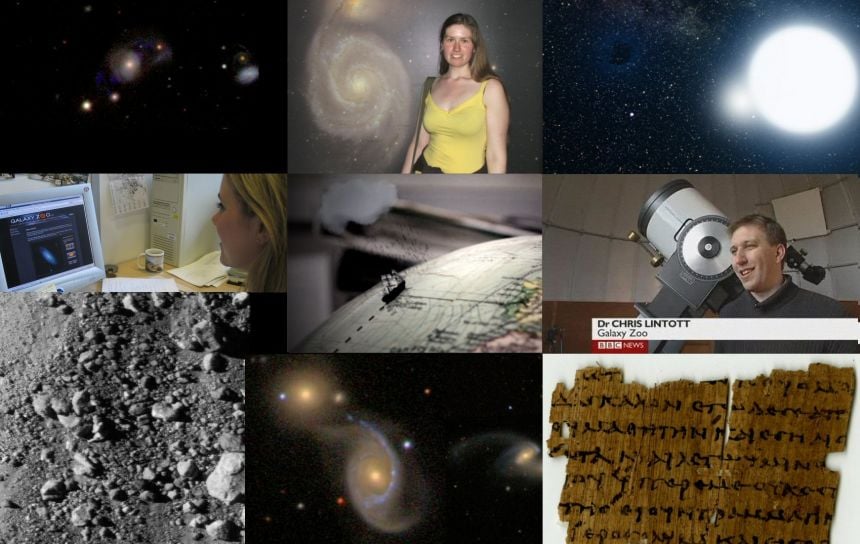
From citizen to scientist?
 Citizen science at Oxford
Citizen science at OxfordAll publicity is good publicity, or so the saying goes, and so by all accounts I should have been pleased by the mention of our Galaxy Zoo project in the Times Higher Education a couple of weeks ago.
On closer inspection, though, there’s something really rather odd about the argument it presents, and not just in giving Galaxy Zoo, which was developed and led here at Oxford University, as an example of an American project (to be fair to THE, they printed a letter correcting this misconception in today’s edition).
The THE article divides into two sets of examples. Two examples from the past (the mathematician Ramanujan, and the discovery of fossils by Mary Anning) and one contemporary story illustrate the remarkable contribution that can be made by exceptional individuals from outside the academy. Inspirational stuff, for sure, even if, as in the case of Ramanujan and Sharon Terry, the chaplain turned biologist mentioned in the article, they were swiftly embraced by conventional institutions.
These shining, trail-blazing examples are contrasted with modern citizen science, such as Galaxy Zoo or Cornell’s amateur birdwatching projects. These, we’re told, are ‘passive’, involving only rudimentary observational activities, instead of a ‘more active and in depth approach’. I’ve dealt with similar criticism of the projects, but there’s a more interesting point here in working out how to encourage deeper engagement with modern scientific data.
The article calls for more openness, leaving the impression that us academics are keeping the data and the fruits of our labours to ourselves.
This isn’t the place to jump into the arguments for open access to journals, but in my opinion what’s missing isn’t a lack of access, but often a lack of confidence. We’ve seen with Galaxy Zoo that there is a tremendous desire to help the process of understanding the Universe - the motivation most often given by respondents to our surveys - but that doesn’t translate to a desire to be dropped head first into a sea of data, literature and jargon.
If you’re a mathematician of the calibre of Ramanujan, such a sink or swim approach will work fine, but for the rest of us some confidence building is needed. What citizen science can do is to build a series of experiences, each richer and more complicated than the last, each of which constitutes an authentic contribution to science.
As Galaxy Zoo volunteers move from classifying objects, to discussing unusual finds on our forums, to collaborating with each other and with the professional scientists on projects, they are essentially navigating an alternative to the traditional career structure. Instead of taking multiple degrees before contributing to research, they are doing something useful from the start, and as a result many more have the confidence and ability to strike out on their own.
The remarkable contribution of Galaxy Zoo volunteers has been made possible by this infrastructure. After all, the project uses almost entirely public data but significant amateur discoveries have only come through our interface, and our supportive and collaborative community.
We’re putting a lot of effort into building tools that gradually lead into this sort of free research. We have just released a paper that depends substantially on the collaboration between professionals and volunteers on the Galaxy Zoo forum. Hubble Space Telescope observations are scheduled this month to follow up on objects identified by volunteers through careful and targeted work.
Does that sound like ‘passive’ participation to you? Me neither.
Dr Chris Lintott, Principal Investigator of Galaxy Zoo, is based at Oxford University's Department of Physics.
Image: highlights from Oxford-led citizen science projects [L-R] distorted galaxies from the new Galaxy Zoo paper; Hanny van Arkel, a schoolteacher who used GZ to find a new type of astronomical object; an eclipsing binary system was discovered by volunteer Carolyn Bol using planethunters.org; launch of GZ website; oldweather.org mines ship weather data; BBC Breakfast and Today interview Chris and GZ volunteers; Moon Zoo volunteers study the lunar surface; GZ Mergers searches for merging galaxies; Ancient Lives gets the public to help transcribe papyri.